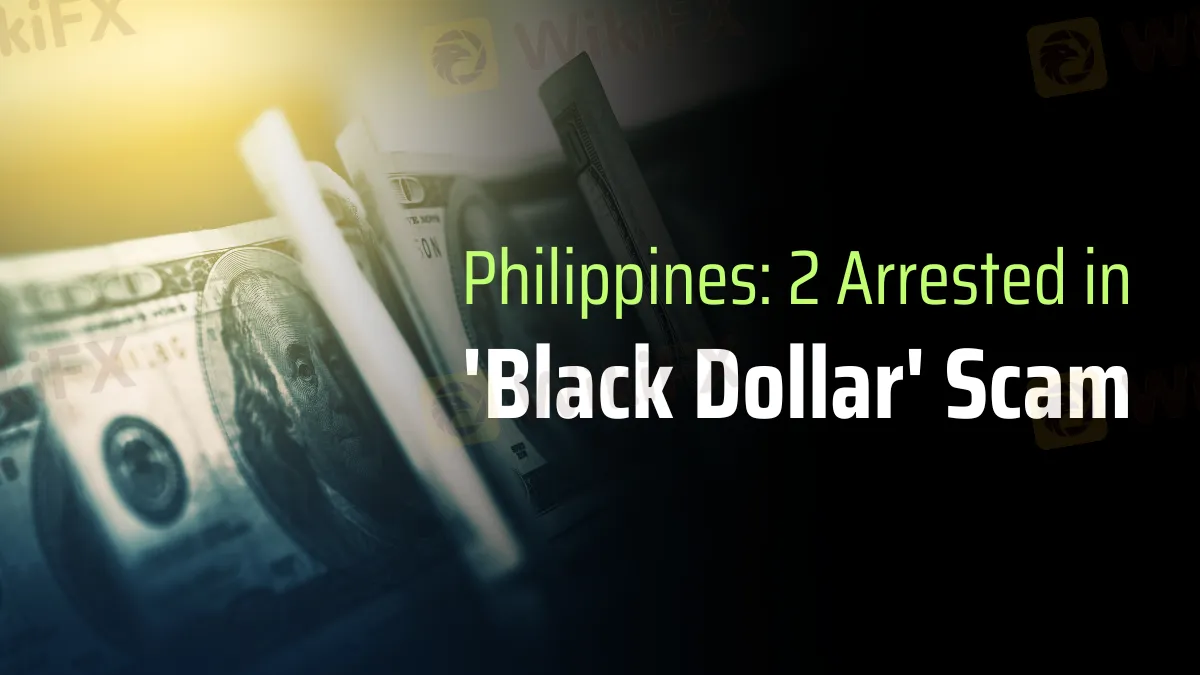简体中文
繁體中文
English
Pусский
日本語
ภาษาไทย
Tiếng Việt
Bahasa Indonesia
Español
हिन्दी
Filippiiniläinen
Français
Deutsch
Português
Türkçe
한국어
العربية
Philippines: 2 Arrested in 'Black Dollar' Scam
Abstract:Two suspected scammers were arrested in the Philippines for a 'black dollar' scam, deceiving victims into buying chemicals to clean and convert counterfeit currency.

The National Bureau of Investigation (NBI) apprehended two suspected fraudsters in accordance with the Revised Penal Code and the Cybercrime Prevention Act. The accused reportedly duped their victims into purchasing chemicals to “clean and convert” counterfeit cash into US dollars.
The fraud included persuading victims that certain chemicals, when appropriately combined, could change counterfeit cash into genuine US dollars. So-called “black dollar” fraudsters in the Philippines have utilized this intricate deception to deceive their naïve victims.
The NBI's Cybercrime Division (NBI-CCD) conducted a sting operation that resulted in the arrest of two African males participating in the “black dollar” scheme. The investigation began on Wednesday in response to a report from a victim who had fallen victim to the fraud.
Arrest Details
The operation began when a complaint was made against a man masquerading as “Dr. Paul.” NBI agents captured Khan Fonkam and his brother Awa Fonkam, both Cameroonians, at Bonifacio Global City (BGC), Taguig, following Director Jaime Santiago's orders.

The Scam Emerges
According to the lawsuit, “Dr. Paul” solicited the victim about investing in the Philippines. They met at a hotel in Makati City on July 5, 2024, and the victim gave them Php400,000 (about $6,844).
“Dr. Paul” then carried out a bogus “decoding process,” which included powdering the money and wrapping counterfeit notes in foil before immersing them in boiling water. He advised the victim not to open the package for 24 hours to enable the chemicals to “work.”
Suspicion and Discovery by the Victim
The victim opened the gift at home, suspicious, to see just black paper inside. When he sought to call “Dr. Paul” for an explanation, he was informed that they couldn't meet and that Php50,000 (about $855) was required for more drugs.
Further inquiry showed that “Dr. Paul” was Khan Fonkam, whom the NBI-CCD had previously captured on May 31, 2024. This finding led the victim to notify police about the deception.
Charges Filed
The accused are currently facing charges at Taguig City Prosecutor's Office. They are accused of estafa (Article 315 of the Revised Penal Code) and unlawful possession and use of counterfeit money (Article 168 of the Revised Penal Code). These accusations are related to Section 6 of Republic Act No. 10175, generally known as the Cybercrime Prevention Act of 2012.
The NBI's quick response in apprehending these fraudsters exemplifies continuous efforts to fight cybercrime and safeguard individuals from deceptive scams. Victims of such scams are advised to report them to authorities so that these misleading tactics might be put a stop to.

Disclaimer:
The views in this article only represent the author's personal views, and do not constitute investment advice on this platform. This platform does not guarantee the accuracy, completeness and timeliness of the information in the article, and will not be liable for any loss caused by the use of or reliance on the information in the article.
Read more

Axi Bids AUD 52M to Acquire Low-Cost Broker SelfWealth, Outbidding Competitor Bell Financial
This acquisition attempt by AxiCorp Financial Services Pty Ltd, Axi’s parent company, values SelfWealth at AUD 0.23 per share and is notably higher than a recent bid made by Bell Financial Group Limited (ASX), which offered AUD 0.22 per share.

Bitfinex Hacker Ilya Lichtenstein Sentenced to 5 Years in Prison
Bitfinex hacker Ilya Lichtenstein was sentenced to 5 years for stealing 120K Bitcoins as the cryptocurrency soars past $93K amid bullish market trends.

Italy’s CONSOB Blocks Seven Unregistered Financial Websites
Italy’s CONSOB ordered seven unauthorized investment websites blocked, urging investors to exercise caution to avoid fraud. Learn more about their latest actions.

CySEC Warns Against Unauthorized Investment Firms in Cyprus
CySEC warns investors about unregulated investment firms in Cyprus. Verify broker reliability through the WikiFX app to stay protected from scams.
WikiFX Broker
Latest News
CySEC Warns Against Unauthorized Investment Firms in Cyprus
Why Even the Highly Educated Fall Victim to Investment Scams?
Warning Against Globalmarketsbull & Cryptclubmarket
Dukascopy Bank Expands Trading Account Base Currencies
UK Sets Stage for Stablecoin Regulation and Staking Exemption
Axi Bids AUD 52M to Acquire Low-Cost Broker SelfWealth, Outbidding Competitor Bell Financial
Crypto Influencer's Body Found Months After Kidnapping
STARTRADER Issues Alerts on Fake Sites and Unauthorized Apps
Italy’s CONSOB Blocks Seven Unregistered Financial Websites
Bitfinex Hacker Ilya Lichtenstein Sentenced to 5 Years in Prison
Currency Calculator


